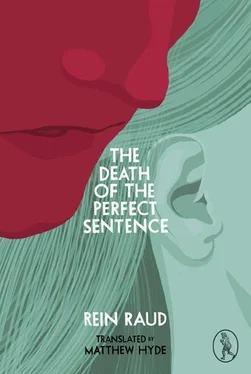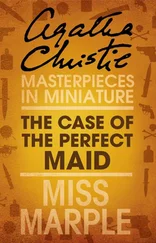Now that same feeling, that same long-forgotten childish feeling reared into Alex’s conscience one again. Only to immediately shatter into little pieces, like a window smashed with a stone. Let’s be honest, it was long overdue.
We see them at the moment when the same thought passes through both their minds: what if our marriage is over? Come to an end? Raim’s father is in the loo, he has just tugged his flies closed but not yet flushed the toilet, and he has coughed up the phlegm accumulated in his throat and spat it out. They’ve got a Polish toilet bowl, with a flush button on the side of the cistern, not a cord hanging from ceiling height. Meanwhile his wife, who expects him to be absent from the room for a while, has swiftly opened the drinks cabinet door, taken out a bottle of Kirsberry Danish liqueur and a glass, and started pouring herself a drink. The large glob of spit and phlegm strikes the surface of the water at exactly the moment when the stream of sweet sticky liquid reaches the bottom of the glass, and that is the very same moment when, completely independently of each other, they both think exactly the same thought: what if it is over, what if it really is? What next? Not that either of them had done anything wrong exactly, no, they strictly adhered to all the moral norms, or at least their understanding of those norms. But without some minor, petty breaking of the laws, rules and conventions, it was impossible to survive in a society which was organised so that every single person felt a little bit guilty before the state – which itself was completely pure and holy. After all, only humans make mistakes, the system was flawless. But let’s not stray from the subject. Raim’s mother blames herself for secretly having been a little too proud of her son. She’d already seen a perfect little man in him from that time at Grandfather’s funeral when, barely five, he was all dressed up in a black suit. It had seemed to come naturally to him to take up his place at the end of the row of people receiving the condolence messages and endure there for a whole hour and a half, looking serious and dignified as he shook every last guest’s hand. She remembered that image the clearest of all from her father-in-law’s funeral – not the journey to Pärnamäe, not the graveside speeches, nor the hysterical biddy and her dim daughter, whose existence they’d known nothing about while her father-in-law was still alive. No, she remembered her grown-up little boy most of all. He still caused a slight sense of unease which she couldn’t properly describe; she still wanted to poke her head round his door every evening and wave him goodnight, but it just wasn’t appropriate any more. Her tough little boy. But maybe she shouldn’t have made so many assumptions. A person can’t be shiny and indestructible like a precious stone – and even some of those can be quite opaque. But once you have got used to thinking of them as strong, then it doesn’t occur to you that they may also have their weaknesses, and may occasionally need your help. Raim’s mother did not know what her son’s weaknesses were, but something clearly wasn’t right if he didn’t come home at night any more. It’s not that he simply didn’t turn up, leaving her waiting until morning, sitting in the kitchen tugging on a cigarette; he would phone in the evening and inform them that he wasn’t coming home, but with no further explanation. You’re not going to say: What do you mean you’re not coming? We’re having cheesecake for pudding and the latest episode of Hercule Poirot is showing on Finnish television. Because if he still doesn’t come, then it must be your fault, you must have been doing something wrong all along, why else would he rather be somewhere else? Raim’s father asks himself the same question, although from a different perspective: Maybe I should have been stricter with him, demanded more of him? You should always ask more of someone who is capable. Meanwhile he is waiting to hear the plopping sound at any moment, because the glob of spit and phlegm has already reached the surface of the water; technically the process which will produce the plop has already begun, it’s just that the air vibrations have not yet transmitted that information to his ears. Maybe I should have insisted on a regime of early rising and workouts; that would have been good for me as well. We went running in the forest now and again in the summer, he liked that; we did squats and pressups by the tree felled by the storm. Maybe I should have thought something up for winter as well, like cold showers to toughen the constitution, and I could have fixed a bar in the doorway to do chin-ups. Although to hell with cold water, the main thing is discipline, order, respect for one’s parents. It’s just not on, phoning like that and saying you’re not coming home, without a word of explanation about where you are or what you’re doing. What kind of home is it if you can just decide not to come back like that? What kind of family? No kind of family at all. Hell. Damn it. I toil like a draught horse and that’s the thanks I get. And then, a millisecond or so later, the plopping sound reaches his ears, he presses the flush and the water washes everything away. But what it leaves behind, his world, is just the same as before. Raim’s parents don’t yet know it, but in less than ten years Estonian television will start to show home-grown serials depicting everyday life, and the scriptwriters will try to create characters just like them for the viewers to have a well-meaning laugh at. And Raim’s parents will laugh too, because they won’t recognise themselves in those characters. And that is for the best.
“What a total bastard you are!” said Lidia Petrovna, trying to hide the tremor in her voice.
She was sitting up in bed and smoking, with her satin pyjama jacket open. Raim had just placed the Minox EC camera on the bedside cupboard and explained to Lidia Petrovna how to use it, and what kinds of pictures she should take with it.
For Raim the moment which followed seemed to last much longer than it actually did, because he had little experience of such situations.
But Lidia Petrovna now had two options.
Her employers would assume that she would inform them about the conversation which had just taken place, and as a consequence Raim would then be arrested, most probably followed by several of his friends and acquaintances, especially the acquaintance who had given Raim that wonderful piece of equipment invented by the Baltic German engineer. In other words, her employers would have assumed that she would betray her lover.
Her lover, however, assumed that she would put her liberty and maybe even her life on the line to join a struggle that she didn’t necessarily identify with in order to enable something to pass across the border between two worlds, something which might eventually determine the fate of many people, most of whom she didn’t even know. In other words, that she would betray her employers.
The question was which of those scenarios would result in Lidia Petrovna betraying herself.
In other words, there was no question.
In those days there was no ferry crossing between Tallinn and Stockholm. Ordinary people got there first by taking the Georg Ots ferry to Finland, staying the night with some friends, meeting up with some other friends the next day and then boarding the evening Silja Line ferry. You didn’t need to book a cabin as there was the so-called sleep-in option, which entitled you to make use of an oblong patch marked on the floor and a mattress placed there for the purpose. The next morning you would alight in the Kingdom of Sweden. However, having being found guilty of anti-Soviet activities and punished by being expelled from the country, Ervin arrived in Sweden by plane, flying on the Moscow-Copenhagen-Stockholm-Bangkok route. Such a route really did exist, and the tickets were relatively cheap too. So Ervin got his first experience of the free world in Copenhagen airport, having had to disembark with his escort while the plane refuelled. The escort was a Russian man of few words; Ervin was unsure if he was fully aware of Ervin’s role in the larger scheme of things, and he obviously didn’t choose to tell him about it. He had no money with him, just the twenty kilos of personal possessions which he had checked in.
Читать дальше












